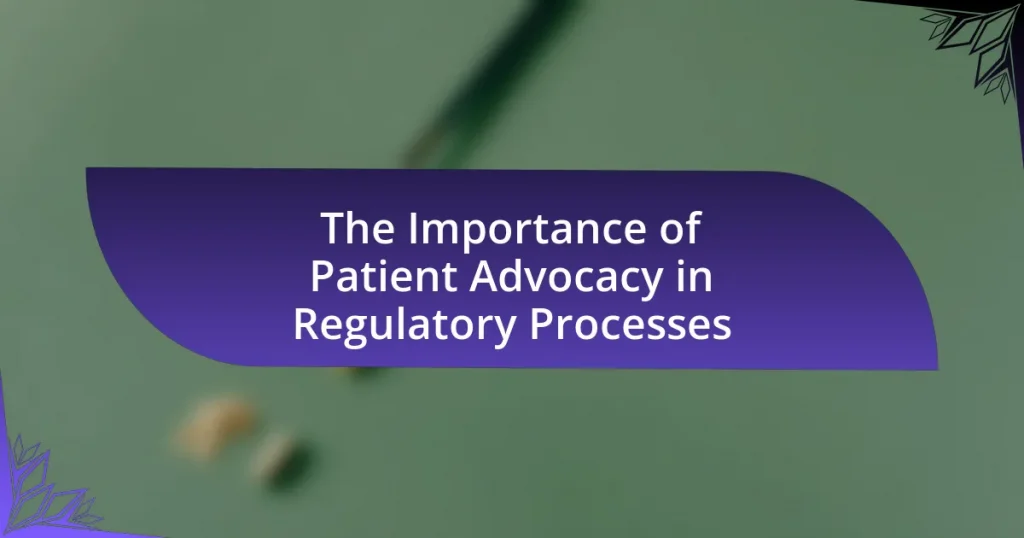The article focuses on the future of personalized medicine within the realm of regulatory affairs, emphasizing the integration of genomic data and advanced analytics into drug approval processes. It outlines how regulatory agencies, particularly the FDA, are adapting their frameworks to address the unique challenges posed by personalized therapies, including tailored clinical trial designs and post-market surveillance. Key characteristics of personalized medicine, its distinction from traditional medicine, and the critical role of regulatory bodies in ensuring safety and efficacy are discussed. The article also highlights current trends, challenges, and ethical considerations in personalized medicine regulation, as well as the implications for future regulatory practices and patient involvement.

What is the Future of Personalized Medicine in Regulatory Affairs?
The future of personalized medicine in regulatory affairs is characterized by increased integration of genomic data and advanced analytics into the drug approval process. Regulatory agencies, such as the FDA, are adapting their frameworks to accommodate the unique challenges posed by personalized therapies, which often require tailored clinical trial designs and post-market surveillance strategies. For instance, the FDA’s 2018 guidance on the use of real-world evidence highlights the agency’s commitment to incorporating diverse data sources to evaluate the safety and effectiveness of personalized treatments. This shift aims to streamline the approval process while ensuring patient safety and efficacy, reflecting a growing recognition of the need for regulations that keep pace with scientific advancements in personalized medicine.
How is personalized medicine defined in the context of regulatory affairs?
Personalized medicine in the context of regulatory affairs is defined as a tailored approach to medical treatment and intervention that considers individual variability in genes, environment, and lifestyle. Regulatory bodies, such as the FDA, emphasize the importance of this approach in drug development and approval processes, ensuring that therapies are effective for specific patient populations based on genetic markers or other characteristics. This definition is supported by the increasing integration of pharmacogenomics in clinical trials, which allows for more precise targeting of therapies, ultimately leading to improved patient outcomes and more efficient healthcare systems.
What are the key characteristics of personalized medicine?
Personalized medicine is characterized by its focus on tailoring medical treatment to the individual characteristics of each patient. This approach utilizes genetic, biomarker, and phenotypic information to guide decisions regarding the prevention, diagnosis, and treatment of diseases. For instance, targeted therapies in oncology often rely on specific genetic mutations present in tumors, allowing for more effective and less toxic treatment options. Additionally, personalized medicine emphasizes the use of advanced technologies, such as genomics and bioinformatics, to analyze patient data, leading to improved outcomes and reduced trial-and-error in treatment selection.
How does personalized medicine differ from traditional medicine?
Personalized medicine differs from traditional medicine by tailoring medical treatment to the individual characteristics of each patient, rather than using a one-size-fits-all approach. Traditional medicine typically relies on standardized protocols based on population averages, while personalized medicine utilizes genetic, environmental, and lifestyle factors to optimize treatment efficacy. For instance, studies have shown that targeted therapies in personalized medicine can significantly improve outcomes in conditions like cancer, where treatments are designed based on specific genetic mutations present in a patient’s tumor. This shift towards individualized care is supported by advancements in genomics and biotechnology, which enable healthcare providers to make more informed decisions based on a patient’s unique profile.
Why is regulatory affairs important for personalized medicine?
Regulatory affairs are crucial for personalized medicine because they ensure that innovative therapies meet safety, efficacy, and quality standards before reaching patients. This field facilitates the approval process for personalized treatments, which often involve complex biological data and tailored approaches. For instance, the U.S. Food and Drug Administration (FDA) has established specific guidelines for the development of personalized therapies, such as companion diagnostics, which are essential for determining patient eligibility for targeted treatments. By navigating regulatory pathways, stakeholders can expedite access to personalized medicine, ultimately improving patient outcomes and advancing healthcare.
What role do regulatory bodies play in personalized medicine?
Regulatory bodies play a crucial role in personalized medicine by establishing guidelines and standards that ensure the safety, efficacy, and quality of personalized therapies and diagnostics. These organizations, such as the U.S. Food and Drug Administration (FDA) and the European Medicines Agency (EMA), evaluate and approve new treatments based on genetic and molecular profiling, which is essential for tailoring therapies to individual patients. For instance, the FDA has implemented the 21st Century Cures Act, which facilitates the development of innovative therapies, including those based on genetic information, thereby promoting advancements in personalized medicine.
How do regulations impact the development of personalized therapies?
Regulations significantly impact the development of personalized therapies by establishing the framework for safety, efficacy, and market access. Regulatory bodies, such as the FDA and EMA, set stringent guidelines that dictate how personalized therapies are developed, tested, and approved. For instance, the FDA’s 21st Century Cures Act encourages innovation in personalized medicine by streamlining the approval process for therapies tailored to specific genetic profiles, thereby facilitating quicker access to treatments for patients. Additionally, regulations ensure that clinical trials for personalized therapies adhere to ethical standards and scientific rigor, which is crucial for gaining public trust and ensuring patient safety.
What are the current trends in personalized medicine regulation?
Current trends in personalized medicine regulation include an increased focus on adaptive regulatory frameworks, which allow for more flexible approval processes that can accommodate the rapid advancements in genomic technologies and targeted therapies. Regulatory agencies, such as the FDA and EMA, are emphasizing the importance of real-world evidence and post-market surveillance to ensure the safety and efficacy of personalized treatments. Additionally, there is a growing trend towards collaboration between regulatory bodies, industry stakeholders, and academic institutions to establish clear guidelines and standards for the development and approval of personalized medicine products. This collaborative approach aims to streamline the regulatory process while ensuring patient safety and access to innovative therapies.
How are advancements in technology influencing regulatory frameworks?
Advancements in technology are significantly influencing regulatory frameworks by necessitating the adaptation of existing laws to accommodate innovations such as artificial intelligence, big data, and genomics. Regulatory bodies, such as the FDA, are increasingly incorporating guidelines that address the complexities of personalized medicine, which relies on these technologies for drug development and patient care. For instance, the FDA’s Digital Health Innovation Action Plan aims to streamline the regulatory process for software-based medical devices, reflecting the need for regulations that can keep pace with rapid technological advancements. This shift is evident in the introduction of adaptive trial designs and real-world evidence, which are becoming integral to regulatory submissions, thereby enhancing the efficiency and relevance of the approval process in personalized medicine.
What are the challenges faced by regulators in personalized medicine?
Regulators face several challenges in personalized medicine, primarily due to the complexity of genetic data and the rapid pace of technological advancements. The integration of genomic information into clinical practice raises issues regarding data privacy, informed consent, and the need for robust regulatory frameworks that can adapt to new scientific discoveries. Additionally, the variability in patient responses to treatments complicates the establishment of standardized guidelines for approval and monitoring. For instance, the FDA has acknowledged the difficulty in evaluating the safety and efficacy of therapies tailored to individual genetic profiles, which often lack extensive clinical trial data. This situation necessitates ongoing collaboration between regulatory bodies, healthcare providers, and researchers to ensure that personalized medicine can be safely and effectively implemented.

What are the implications of personalized medicine for regulatory practices?
Personalized medicine significantly impacts regulatory practices by necessitating the adaptation of existing frameworks to accommodate individualized treatment approaches. Regulatory agencies, such as the FDA, must develop new guidelines that address the complexities of genetic and biomarker-based therapies, ensuring safety and efficacy for diverse patient populations. For instance, the FDA’s 2018 guidance on the development of gene therapies illustrates a shift towards more flexible regulatory pathways that consider the unique characteristics of personalized treatments. This evolution in regulatory practices aims to facilitate innovation while maintaining rigorous standards for patient safety and therapeutic effectiveness.
How can regulatory frameworks adapt to personalized medicine?
Regulatory frameworks can adapt to personalized medicine by implementing flexible guidelines that accommodate the unique characteristics of individualized treatments. This adaptation involves the establishment of adaptive regulatory pathways that allow for real-time data collection and analysis, enabling regulators to assess the safety and efficacy of personalized therapies more efficiently. For instance, the FDA’s Breakthrough Therapy designation exemplifies how regulatory bodies can expedite the development and review of drugs that target specific patient populations, thereby facilitating quicker access to innovative treatments. Additionally, incorporating biomarker-driven approaches into regulatory assessments can enhance the precision of evaluations, ensuring that therapies are tailored to the genetic profiles of patients. This shift not only aligns regulatory practices with the evolving landscape of personalized medicine but also promotes patient-centric care and improved health outcomes.
What changes are needed in existing regulations?
Existing regulations need to adapt to the rapid advancements in personalized medicine by incorporating flexible frameworks that allow for the evaluation of innovative therapies and diagnostics. Current regulations often lag behind technological progress, which can hinder the timely approval of personalized treatments. For instance, the FDA’s 21st Century Cures Act emphasizes the need for adaptive trial designs and real-world evidence, reflecting the shift towards more individualized patient care. Additionally, regulations should facilitate collaboration between regulatory bodies and stakeholders in the healthcare ecosystem to ensure that guidelines are relevant and effective in addressing the complexities of personalized medicine.
How can collaboration between stakeholders improve regulatory processes?
Collaboration between stakeholders can significantly improve regulatory processes by fostering communication, enhancing transparency, and facilitating the sharing of expertise. When diverse stakeholders, including regulatory agencies, industry representatives, healthcare professionals, and patient advocacy groups, work together, they can identify potential regulatory challenges early and develop solutions that are informed by a wide range of perspectives. For instance, the FDA’s Patient-Focused Drug Development initiative exemplifies how stakeholder collaboration can lead to more patient-centered regulatory outcomes by incorporating patient input into the drug approval process. This collaborative approach not only streamlines regulatory pathways but also increases the likelihood of successful product development and market entry, ultimately benefiting public health.
What are the ethical considerations in personalized medicine regulation?
Ethical considerations in personalized medicine regulation include patient autonomy, informed consent, data privacy, and equitable access to treatments. Patient autonomy emphasizes the right of individuals to make informed decisions about their healthcare based on personalized information. Informed consent is crucial, as patients must understand the implications of genetic testing and the potential outcomes of personalized therapies. Data privacy concerns arise from the sensitive nature of genetic information, necessitating robust protections to prevent misuse. Lastly, equitable access addresses the potential disparities in healthcare, ensuring that advancements in personalized medicine benefit all populations rather than exacerbating existing inequalities. These considerations are vital for fostering trust and ensuring ethical practices in the evolving landscape of personalized medicine.
How do ethical concerns shape regulatory decisions?
Ethical concerns significantly influence regulatory decisions by guiding the development of policies that prioritize patient safety, informed consent, and equitable access to treatments. Regulatory bodies, such as the FDA and EMA, incorporate ethical frameworks to assess the implications of personalized medicine, ensuring that innovations do not compromise ethical standards. For instance, the Belmont Report outlines principles of respect for persons, beneficence, and justice, which regulators apply when evaluating clinical trials and therapeutic interventions. This alignment with ethical principles helps to foster public trust and ensures that regulatory practices reflect societal values, ultimately shaping the landscape of personalized medicine.
What measures can be taken to ensure patient safety and privacy?
To ensure patient safety and privacy, healthcare organizations must implement robust data protection protocols and adhere to regulatory standards such as HIPAA. These measures include encrypting patient data, conducting regular security audits, and training staff on privacy policies. For instance, a study by the Ponemon Institute found that organizations with comprehensive data protection strategies experience 50% fewer data breaches. Additionally, utilizing secure communication channels for patient interactions further safeguards sensitive information.

What are the future prospects for personalized medicine in regulatory affairs?
The future prospects for personalized medicine in regulatory affairs are promising, as regulatory bodies increasingly recognize the need for tailored approaches to drug approval and patient treatment. Regulatory agencies, such as the FDA, are adapting frameworks to accommodate the complexities of personalized therapies, including the use of biomarkers and genetic information to guide treatment decisions. For instance, the FDA’s 2018 guidance on the use of real-world evidence in regulatory submissions highlights a shift towards more flexible and responsive regulatory processes that can better support personalized medicine initiatives. This evolution is expected to enhance patient outcomes and streamline the approval process for innovative therapies, reflecting a growing commitment to integrating personalized medicine into mainstream healthcare.
How might personalized medicine evolve in the next decade?
Personalized medicine is expected to evolve significantly in the next decade through advancements in genomics, artificial intelligence, and regulatory frameworks. These advancements will enable more precise targeting of therapies based on individual genetic profiles, leading to improved treatment outcomes. For instance, the integration of AI in analyzing large genomic datasets will facilitate the identification of biomarkers that predict patient responses to specific treatments, enhancing the efficacy of personalized therapies. Additionally, regulatory bodies are likely to adapt their guidelines to accommodate these innovations, ensuring that personalized medicine can be safely and effectively implemented in clinical practice. This evolution is supported by the increasing number of FDA-approved targeted therapies, which rose from 13 in 2010 to over 50 by 2020, demonstrating a clear trend towards personalized approaches in medicine.
What innovations are expected to influence regulatory practices?
Innovations such as artificial intelligence, machine learning, and real-time data analytics are expected to significantly influence regulatory practices. These technologies enable regulators to analyze vast amounts of data quickly, improving decision-making processes and enhancing the ability to monitor compliance. For instance, AI algorithms can predict potential safety issues in personalized medicine by analyzing patient data and clinical trial results, thereby facilitating more proactive regulatory responses. Additionally, the integration of blockchain technology can enhance transparency and traceability in drug supply chains, further supporting regulatory oversight.
How will patient involvement shape the future of regulation?
Patient involvement will significantly shape the future of regulation by ensuring that regulatory frameworks are more aligned with the needs and preferences of patients. As regulatory bodies increasingly recognize the value of patient insights, they are incorporating patient perspectives into decision-making processes, which enhances the relevance and effectiveness of regulations. For instance, the FDA’s Patient-Focused Drug Development initiative exemplifies this shift, as it actively seeks patient input on disease impacts and treatment preferences, thereby informing regulatory assessments and approvals. This trend indicates a move towards more patient-centered regulations, ultimately leading to improved health outcomes and greater trust in the regulatory system.
What best practices can be adopted for effective regulation of personalized medicine?
Effective regulation of personalized medicine can be achieved by adopting best practices such as establishing clear guidelines for clinical validation, ensuring robust data privacy protections, and fostering collaboration among stakeholders. Clear guidelines for clinical validation are essential, as they provide a framework for assessing the safety and efficacy of personalized therapies, which is critical given the unique nature of these treatments. Data privacy protections are vital to maintain patient trust and comply with regulations like the Health Insurance Portability and Accountability Act (HIPAA), which mandates stringent safeguards for personal health information. Collaboration among stakeholders, including regulatory agencies, healthcare providers, and industry representatives, facilitates the sharing of knowledge and resources, leading to more informed decision-making and streamlined approval processes. These practices are supported by the increasing complexity of personalized medicine, which necessitates a coordinated approach to regulation that balances innovation with patient safety.
How can regulatory agencies enhance their responsiveness to innovations?
Regulatory agencies can enhance their responsiveness to innovations by adopting adaptive regulatory frameworks that allow for real-time evaluation and approval processes. These frameworks enable agencies to quickly assess new technologies and treatments, such as personalized medicine, which often require rapid adaptation to scientific advancements. For instance, the FDA’s Breakthrough Devices Program exemplifies this approach by facilitating faster access to innovative medical devices that address unmet medical needs, demonstrating a commitment to agility in regulatory processes. This responsiveness is crucial as it aligns regulatory practices with the pace of innovation in the healthcare sector, ensuring that patients benefit from new therapies without unnecessary delays.
What strategies can stakeholders implement to navigate regulatory challenges?
Stakeholders can implement proactive engagement with regulatory bodies to navigate regulatory challenges effectively. This strategy involves establishing open lines of communication with regulators to understand evolving requirements and expectations. For instance, stakeholders can participate in public consultations and advisory committees, which allows them to influence policy development and gain insights into regulatory trends. Additionally, investing in compliance training and employing regulatory experts can enhance stakeholders’ ability to interpret and adhere to complex regulations, thereby reducing the risk of non-compliance. Evidence from the FDA’s initiatives shows that early collaboration between stakeholders and regulators can lead to more efficient approval processes and better alignment with regulatory standards.



